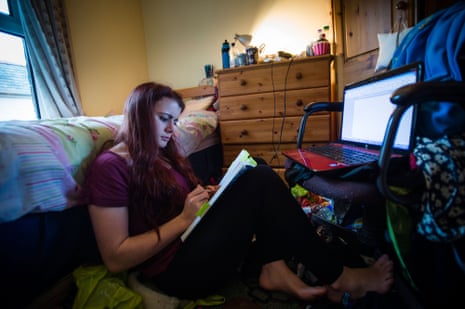One in three students starting university this year may opt to live at home, according to new research that found rising costs and family needs are affecting the “Covid generation” of school-leavers.
Before the pandemic about 20% of first year undergraduates in England lived at home while studying, including older mature students. But a new survey of current sixth formers by University College London found that as many as 34% of 18-year-old school-leavers could stay at home if accepted by their first-choice university when exam results are published next week.
While some students planning to live at home said their preferred university was nearby, most said they could not afford to live away from home or needed to remain near their families, which researchers said was often a proxy for needing financial support.
Jake Anders, the lead author of the study, said that disadvantaged students were more likely to be affected by cost pressures, and that living at home could see them “cut off” from more attractive courses and university offers, possibly damaging their future careers.
“If you are making decisions on which course on the basis of cost you are being cut off from a whole range of universities that might give you exactly what you need,” Anders said. “For a minority who happen to live near the most appropriate university that may be the right choice, but given the strengths of different universities across the country it seems more likely that the best choice isn’t nearby.”
The study, led by the Sutton Trust and UCL’s centre for education policy and equalising opportunities, interviewed 11,000 young people in England who took A-levels and other exams this year and are due to start studies or move into work.
The survey found that students from disadvantaged families were more likely to be affected by the financial challenges of studying away from home. Young people from families who used a food bank or who were in arrears on mortgage or rent payments were much more likely to plan on living at home than others.
Overall, 20% of those applying to university said they planned to live at home during term time if they were successful in getting into their preferred university when exam results were published next week, while a further 14% were considering whether to move.
The results also revealed that 8% of the young people surveyed were family carers, with regular responsibilities for looking after ill, disabled or elderly relatives without receiving payment.
Sir Peter Lampl, chair of the Sutton Trust, said the finding highlighted the difficult decisions that were limiting the future of young people. “The Sutton Trust is calling for the government to reintroduce maintenance grants so that disadvantaged young people can study away from home and benefit from the full university experience,” Lampl said.
Nehaal Bajwa, NUS vice-president, said that living at home was being “increasingly forced” upon young people by financial circumstances and rising costs.
“Parents and families have been hit by the cost of living crisis as much as students, and the financial support they are able to give has dropped, from £44 a week to about £34 a week. And student loans have failed to keep pace with inflation,” Bajwa said. “The government offers piecemeal reform, but we need root and branch restructuring of the whole system. Only then will students, regardless of their background, have the freedom to choose how they want to live and maximise their potential.”
Rachel Hewitt, chief executive of MillionPlus group of universities, said: “With financial pressure hitting the most disadvantaged in society hardest it is no surprise that so many new students are planning to live at home while they study.
“Modern universities have huge experience with commuter students and are well equipped to ensure that students for whom living at home is the best option are able to succeed at university.
“That said, we must not allow the cost of living crisis to undo the huge strides that have been made in widening access and participation. The government should consider re-introducing maintenance grants to relieve some of the financial squeeze and must include students in any further cost of living measures implemented.”
A Universities UK spokesperson said: “No student should have to make a decision about their future due to financial pressures – including whether to study away from home.
“University is an excellent investment, and we urge the government to reintroduce maintenance grants and ensure student support keeps pace with inflation so that less advantaged students are free to choose the route which is best for them.”
The Department for Education said: “Our student finance system ensures that the highest levels of support are targeted at students from the lowest income families. This means support goes where it is needed most while ensuring the student finance system remains financially sustainable.
“We are also supporting universities to help students who are struggling financially by making £276m available from this month, which institutions can use to top up their own hardship schemes. This is on top of increases to student loans and grants.”
